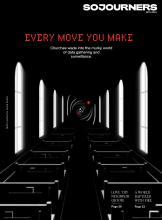WE ARE APPROACHING the end of the liturgical year, and the texts have a thread of anticipation running through them. We are deep into the promises conveyed by the prophets and the eschatological vision cast by Jesus. The texts are inviting us to prepare ourselves for something — but what, exactly?
The last Sunday in November, in many traditions, is the Advent Sunday of hope. In biblical Greek, the verb is elpizō (“hope”), which means to wait for salvation with both joy and full confidence. When we hope, we wait not out of boredom or a lack of options but in full confidence that what we are waiting for will arrive. This is the same word used in Hebrews 11:1, “Now faith is the assurance of things hoped for, the conviction of things not seen.” The word “assurance” here can also be translated as “foundation,” as in that of a house. Faith is what anchors our hope into the ground and allows it to stand upright. Faith also often requires that we act before we see. Our hope is first materialized in our faith before it is ever materialized in our reality. Hope pushes us to walk, move, and live as if what we’ve hoped for has already arrived.
Perhaps this moment calls to us to build foundations for the futures we need in defiance of our present realities. Our texts dare us to live into new possibilities, even as our current condition offers far fewer promises.
Read the Full Article

